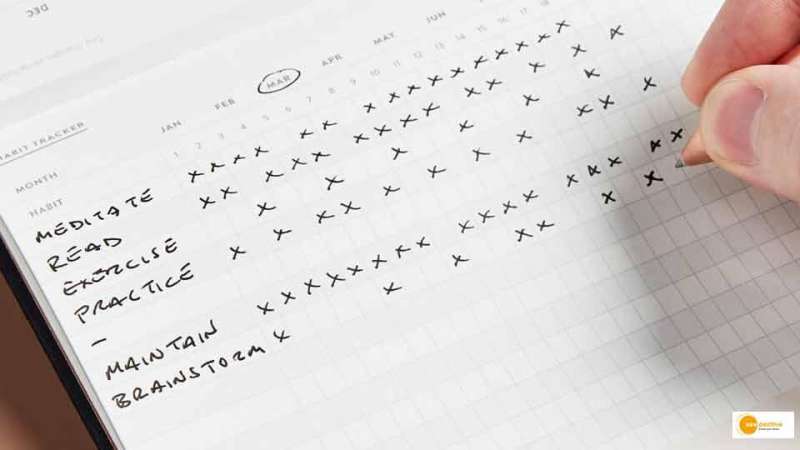

It is no secret that developing positive habits can be challenging, however, keeping track of them can make a significant difference. Habit tracking is a method of recording your daily activities to monitor your progress toward your goals. By tracking your habits, you can stay accountable, evaluate your progress, and adjust as needed. Here’s the benefits of habit tracking and provide practical tips for getting started.
Why Track Your Habits?
1. Accountability:
One of the main benefits of habit tracking is accountability. When you write down your goals and track your progress, you are more likely to stick to them. Habit tracking helps you stay accountable to yourself by providing a visual representation of your progress. It can be especially helpful for those who struggle with motivation or consistency. Seeing your progress can provide a sense of accomplishment and encourage you to continue working towards your goals. Additionally, tracking your habits can help you identify areas where you may be falling short and adjust your approach accordingly.
2. Self-Awareness:
Habit tracking can also increase your self-awareness. By recording your activities, you can identify patterns in your behaviors and habits. This can provide insight into why you may be struggling to make progress toward your goals or why you may be experiencing negative outcomes. With this awareness, you can develop healthier habits and eliminate negative ones. Moreover, habit tracking can help you identify triggers that may be causing certain behaviors, which can be beneficial for those looking to make significant changes in their lives. Overall, habit tracking provides a powerful tool for improving your self-awareness and making positive changes in your life.
3. Goal Setting:
Habit tracking is an effective tool for goal setting. By tracking your progress, you can break down larger goals into smaller, more manageable tasks. This helps you see the progress you have made and stay motivated to continue working towards your goals. By setting achievable goals, you can avoid feeling overwhelmed and discouraged, which can often lead to giving up altogether. Habit tracking provides a sense of accomplishment as you complete each task, which can be incredibly satisfying and motivate you to keep going. Additionally, tracking your progress allows you to make adjustments to your approach if necessary, ensuring that you are on the right track toward achieving your goals.
How to Track Your Habits
1. Identify your goals: Before you begin tracking your habits, identify your goals. Do you want to exercise more, eat healthier, or read more? Write down your goals and break them down into smaller, more manageable tasks.
2. Choose a tracking method: There are numerous methods for tracking habits, including apps, spreadsheets, and bullet journals. Choose a method that works best for you and that you are likely to stick to.
3. Decide on the frequency: Determine how often you want to track your habits. Will you track them daily, weekly, or monthly?
4. Set up your tracker: Once you have chosen your tracking method and frequency, set up your tracker. Write down your goals and the habits you want to track. Make sure to keep your tracker in a place where you will see it regularly.
5. Record your habits: Begin tracking your habits. Make a note of each time you complete a habit or miss one. Over time, you will be able to see your progress and identify areas for improvement.
6. Be specific: When setting up your tracker, be specific about the habit you want to track. For example, instead of “exercise more,” be specific about what type of exercise you want to do and how often.
7. Start small: If you’re new to habit tracking, start with just a few habits at a time. Trying to track too many habits at once can be overwhelming and lead to giving up.
8. Use reminders: Consider using reminders, such as alarms or notifications, to help you remember to track your habits and stay on track.
9. Be patient: Developing new habits takes time and patience. Don’t get discouraged if you don’t see progress right away. Keep tracking your habits and stay focused on your goals.
Tips for Successful Habit Tracking
1. Keep it simple: Don’t try to track too many habits at once. Start with a few habits and gradually add more as you get into the habit of tracking.
2. Be consistent: Make a habit of tracking a part of your daily routine. Set aside time each day to record your habits.
3. Celebrate your successes: Celebrate your successes, no matter how small. This will help you stay motivated and continue working towards your goals.
4. Review your progress: Take time to review your progress regularly. Look for patterns, identify areas for improvement, and adjust your habits as needed.
5. Stay flexible: Be willing to adjust your tracking method or habits as needed. If you find that a particular habit is not working for you or your tracking method is not effective, don’t be afraid to try something new.
6. Use positive reinforcement: Use positive reinforcement to motivate yourself. Reward yourself for reaching milestones or completing habits. This can be as simple as treating yourself to a movie or a favorite meal.
7. Get support: Don’t be afraid to enlist the help of friends or family members. Share your goals with them and ask for their support. Having someone to hold you accountable can be a powerful motivator.
8. Don’t give up: Habits take time to form, and it can be easy to become discouraged if you don’t see progress right away. Remember that success is a journey, not a destination, and don’t give up on yourself.
Habit tracking can be a powerful tool for developing positive habits and achieving your goals. By staying accountable, increasing self-awareness, and breaking down larger goals into smaller tasks, you can create lasting change in your life.


